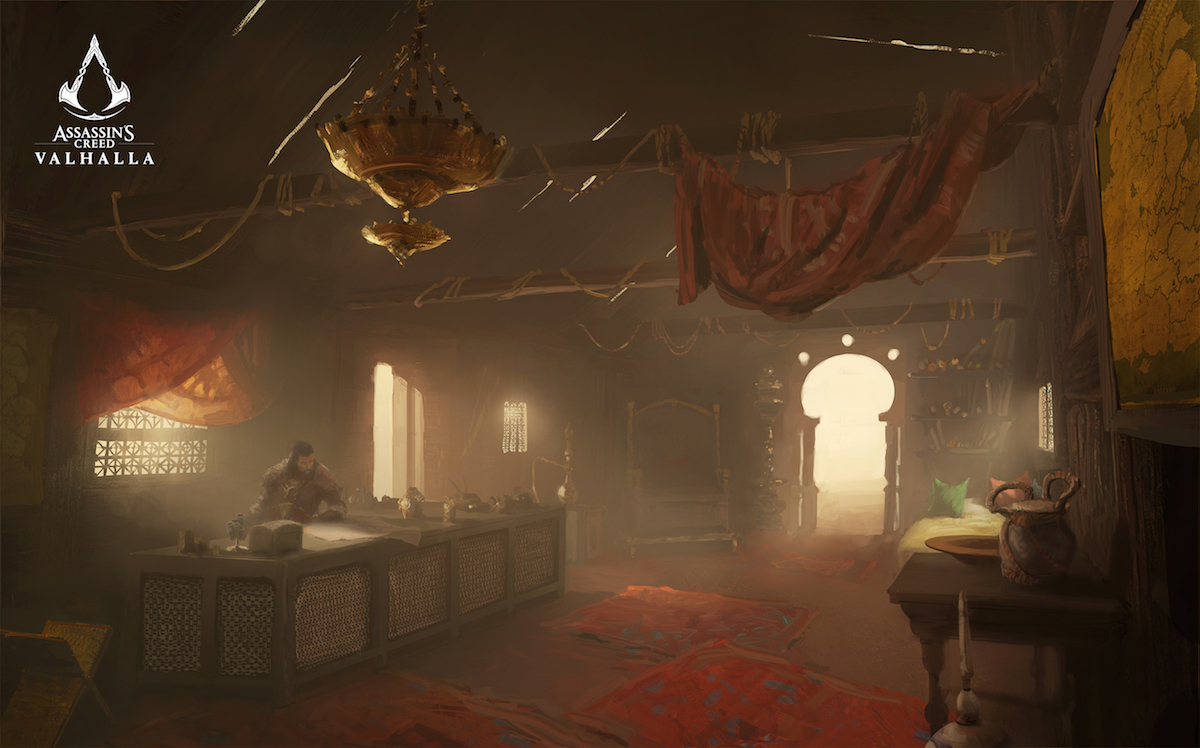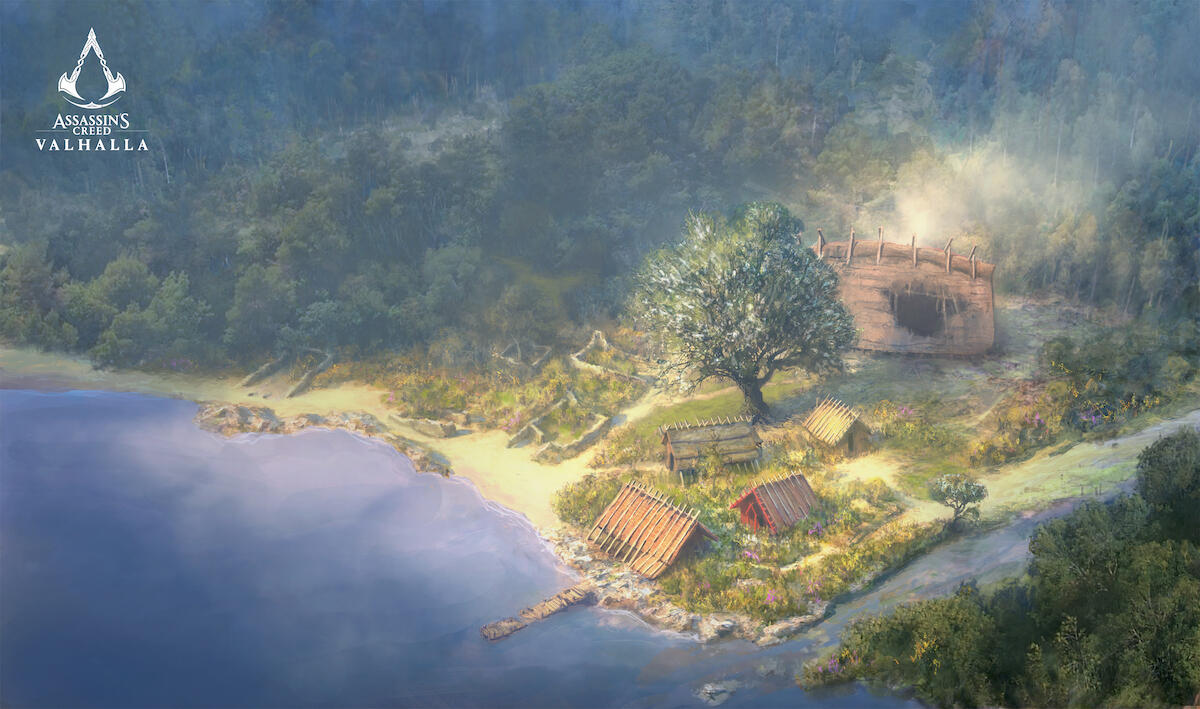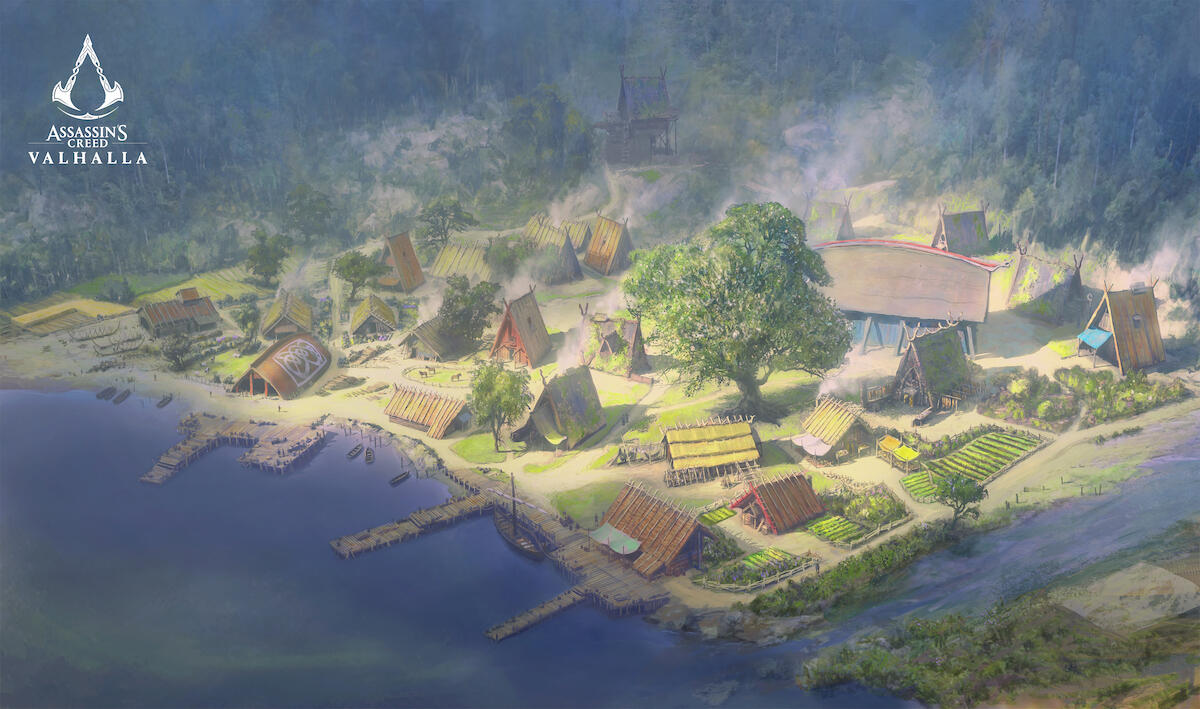Ahead of Assassin's Creed Valhalla's release, I had the opportunity to check out how settlement building will work in the game. Though Ubisoft has described the establishment of a new home for Eivor's people as a major motivation for the character, there's been little shown about this aspect of Valhalla so far. I was a bit surprised to see just how much the settlement factors into Valhalla's gameplay loop, serving as a place you'll regularly visit and invest in throughout the campaign. It feels like an improvement to how home bases have worked in Assassin's Creed in the past, largely for how it pulls you into Eivor's life beyond their mission.
"It was really important when we designed [the settlement] that it felt exactly like when you come back home after a long journey away--you work in some other places, other regions, other countries, and you come back to your family and some element has changed," explained David Bolle, level designer on the settlement feature.
In a video presentation, Bolle showed me how Eivor's settlement evolves over the course of the game. Some of the changes are caused by you; for example, spending resources to build shops will, in turn, welcome settlers to set up camp in the area and join your community. Other times, the changes happen without you. For instance, you may return after a lengthy campaign mission only to find some traders have set up shop or that some of the people have elected to improve the architecture of certain structures and make the place feel more like a permanent residence for its people.
Unlike the home bases in other Assassin's Creed games, Valhalla's settlement is a permanent fixture in the campaign. You choose which campaign mission you want to tackle next from your war room and regularly return to the settlement after a mission is done to invest resources, talk to your allies, and pick up side-quests. You'll also be returning to the settlement to improve Eivor's loadout. Valhalla is the first Assassin's Creed game to restrict blacksmiths, tailors, and most other vendors to your settlement. As a Viking, Eivor is unwelcome in most of the territories they visit, so they'll have to regularly return home to do things that other Assassin's Creed protagonists could do at pretty much any of the cities they visited.
There's plenty of reason to return to the settlement beyond upgrading Eivor, as well. One of the allies who joins your group is Hytham, a Hidden One (the group that will one day become the Assassin Brotherhood). He'll ask you to help him build a Hidden One Bureau as part of the settlement, reestablishing the group in England. Through this bureau, you learn about the Order of Ancients (the group that will one day become the Templar Order). Much like the Cult of Kosmos in Assassin's Creed Odyssey, you can hunt down the members of the Order, revealing clues to the whereabouts and identities of its leaders. Killing them allows you to take their medallions, which you can turn in to Hytham for rewards and new tidbits of lore. "[Hytham] will teach you some key elements of the Assassin lore and some abilities too," Bolle said. "And by cashing in medallions to him, he will teach you more stuff related to the Assassins and skills, and even give you some weapons."
Although I didn't get the chance to check out every single structure that you can build in the game, quite a few caught my eye. There's the seer's house (where you can speak to a woman who cryptically talks about allowing you to relive the life of Odin), the stables (where you can customize your horse and raven companions and also teach your horse new skills, like swimming), a museum (where you can store Roman artifacts you happen upon in your travels), and quite a few more. As you build Eivor's renown--either through the construction of new buildings or completing specific quests--the settlement will level up. With each level, the settlement grows in size, and new types of services are added for you to invest in.
To encourage players that the settlement is worth investing in, the place is designed to feel like there is a life to it. "In the settlement, everybody's unique, they all have their name, their house, their job," Bolle said. "So when you go to the house of someone, you will see them working there and doing their thing, but you can also [see] them talking to each other in the middle of the settlement and stuff. They all have their own agendas. And they are also parts of main quests tied to the settlement."
And as you get to know the people who you're making a home with, romance may bloom. "Some of those characters will offer romances, and even a relationship," Dolle said. "So you could go on a date with them and decide to be in a relationship with them. And that, without spoiling too much, might lead you into trouble sometimes--be careful who you choose to be with."
I wasn't able to see how a possible relationship could end badly or get you into trouble, but I have somewhat of an idea after seeing the last core gameplay aspect of the settlement: passing judgement. In a scene that played out almost shot-for-shot like Dragon Age: Inquisition's Sit in Judgement side-quests, I saw Eivor drawn into being the final say on a dispute between two members of the settlement. It was a minor argument--one that seemed more played for laughs than anything else--but I can see how this system could come back to bite you on more substantial disagreements or settlement-changing arguments, especially if someone your Eivor is in love with is one of the parties involved.

"Without going into much detail, because that would actually spoil the story, some [decisions] are just tiny impacts in the world, really tiny," Dolle said. "Some have a deep impact in your relationship with some characters. I can't say more, but yeah, sometimes [a decision] is just there to have something to evolve, to see a character evolve. And sometimes, it's much deeper." I did happen to notice that you can build a cemetery for your settlement, so I imagine some of your choices might end with a character's death. Additionally, in the preview I saw, not everyone is on board with Eivor being the de facto leader and having final say on all decisions in their brother's absence--I'm curious to see whether Valhalla builds on that and asks you to make difficult choices where you have to weigh the peace of the community against maintaining a friend or lover's trust. Choices like that would be new territory for Assassin's Creed.
At the very least, I'm intrigued to see how the settlement might impact how Assassin's Creed Valhalla's story is told. Pretty much every Assassin's Creed game has had a home base--and a few have allowed you to upgrade and improve them--but they've never been designed as mandatory parts of the story. The stories in previous Assassin's Creed titles are all designed as lines in which you steadily travel from one place to the next, only really returning to the home base for specific cutscenes or optional quests. Valhalla's story sounds more like a loop than a twisting line--you're regularly returning to your settlement and helping it grow before setting out again. Eivor isn't some solo act on their own quest. In Valhalla, you're an active member of a group of people.
With this set-up, Valhalla seems ideally primed to get at the heart of what an Assassin is supposed to be. They're not supposed to just be killers of tyrants (though, that is a major part of the job description), they're also very aggressive proponents of social justice and personal freedom who invest resources into the people that they protect. It could be pretty cool to see if Valhalla's story is where that aspect of the Assassin Brotherhood is born. And if this new gameplay loop works out and is well-received, I could see it being iterated on in future sequels (similarly to what happened with naval combat) because of how much it feels right for an Assassin's Creed game.
We'll find out just how well this settlement system works out when Assassin's Creed Valhalla launches for Xbox Series X/S, Xbox One, PlayStation 4, PC, and Google Stadia on November 10, before also releasing for PlayStation 5 on November 12.
Assassin's Creed News & Announcements
- Assassin's Creed Valhalla Reminds Me Of Playing Black Flag
- Assassin's Creed Valhalla: Eivor's Mysterious Identity, Interwoven Story, And Hidden Ones Connection
- Assassin's Creed Valhalla Has Four Different Editions You Can Pre-Order Soon
- + Show More Assassin's Creed News & Announcements Links (1)
- Assassin’s Creed Valhalla Release Date Officially Revealed



